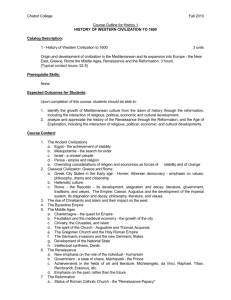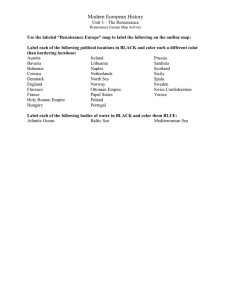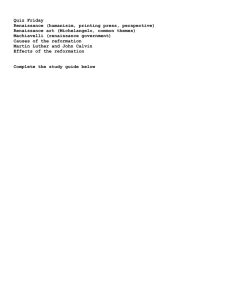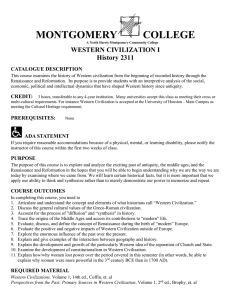Chabot College Fall 2002 Course Outline for History 1
advertisement
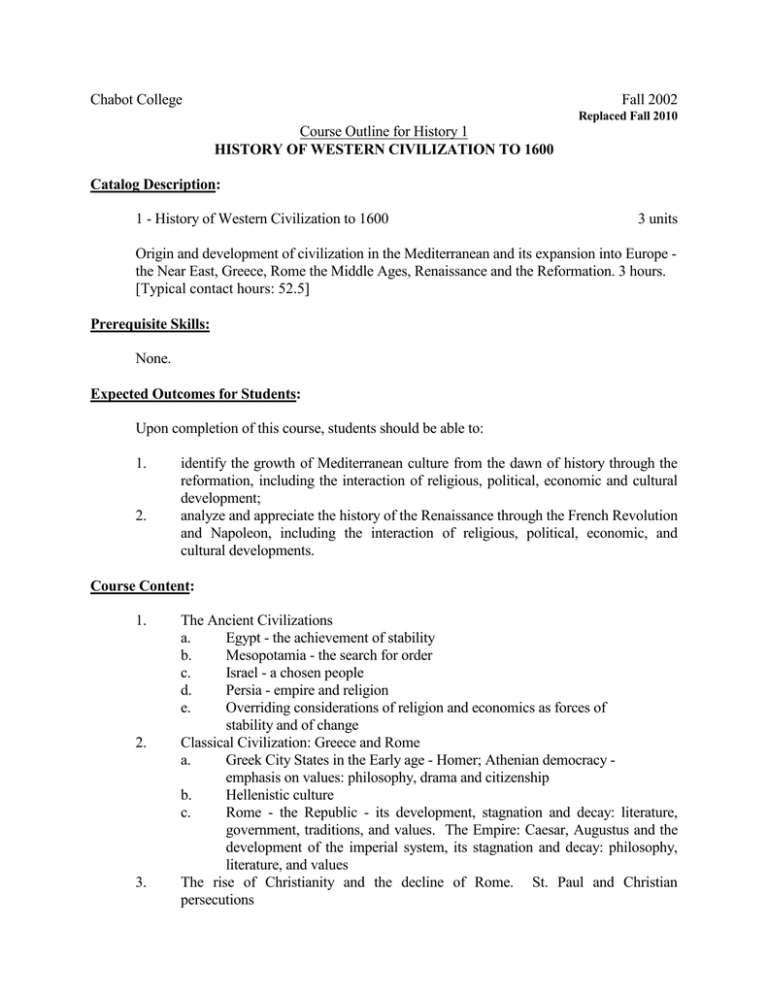
Chabot College Fall 2002 Replaced Fall 2010 Course Outline for History 1 HISTORY OF WESTERN CIVILIZATION TO 1600 Catalog Description: 1 - History of Western Civilization to 1600 3 units Origin and development of civilization in the Mediterranean and its expansion into Europe the Near East, Greece, Rome the Middle Ages, Renaissance and the Reformation. 3 hours. [Typical contact hours: 52.5] Prerequisite Skills: None. Expected Outcomes for Students: Upon completion of this course, students should be able to: 1. 2. identify the growth of Mediterranean culture from the dawn of history through the reformation, including the interaction of religious, political, economic and cultural development; analyze and appreciate the history of the Renaissance through the French Revolution and Napoleon, including the interaction of religious, political, economic, and cultural developments. Course Content: 1. 2. 3. The Ancient Civilizations a. Egypt - the achievement of stability b. Mesopotamia - the search for order c. Israel - a chosen people d. Persia - empire and religion e. Overriding considerations of religion and economics as forces of stability and of change Classical Civilization: Greece and Rome a. Greek City States in the Early age - Homer; Athenian democracy emphasis on values: philosophy, drama and citizenship b. Hellenistic culture c. Rome - the Republic - its development, stagnation and decay: literature, government, traditions, and values. The Empire: Caesar, Augustus and the development of the imperial system, its stagnation and decay: philosophy, literature, and values The rise of Christianity and the decline of Rome. St. Paul and Christian persecutions Chabot College Course Outline for History 1 Fall 2002 Page 2 Course Content (Cont'd): 4. 5. 6. 7. The Byzantine Empire The Middle Ages a. Charlemagne - the quest for Empire b. Feudalism and the medieval economy - the growth of the city c. Chivalry, the Crusades, and Islam d. The spirit of the Church - Augustine and Thomas Acquinas e. The Gregorian Church and the Holy Roman Empire f. The Germanic invasions and the new Germanic States g. Development of the National State h. Intellectual synthesis, Dante The Renaissance a. New emphasis on the role of the individual - humanism b. Government - a state of chaos, Machiavelli - the Prince c. Achievements in the fields of art and literature: Michelangelo, da Vinci, Raphael, Titian, Rembrandt, Erasmus, etc. d. Emphasis on the past, rather than the future The Reformation a. Status of Roman Catholic Church - the "Renaissance Papacy" b. Heroes and Heretics - Albigensians and Wycliffe and Hus c. Martin Luther Ulrich Zwingli John Calvin Thomas Cranmer d. The Church of England and Henry VIII e. The Counter Reformation Methods of Presentation: 1. 2. 3. Lecture-discussion Student reports Appropriate Audio-Visual materials Assignments and Methods of Evaluating Student Progress: 1. Typical Assignments a. Assigned reading and class discussion b. Three or four essay examinations of 1500-2000 words each c. Regular attendance Chabot College Course Outline for History 1 Fall 2002 Page 3 Assignment and Methods of Evaluating Student Progress (Cont'd) 2. Methods of Evaluating Student Progress a. Essays b. Grades A through F according to performance c. Final Exam Textbook(s) (Typical): A Short History of Western Civilization, Harrison, Sullivan, Sherman, Knopf Publishing Co., 2001 or latest edition. Special Student Materials: None. tf MW:FILES\HIST.1 REVISED: 2-28-2002
